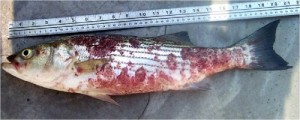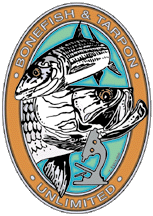 Received this message from our good friend Ed Mitchell about a disease ravaging striped bass populations in the Chesapeake Bay. Frightening stuff. Please read:
Received this message from our good friend Ed Mitchell about a disease ravaging striped bass populations in the Chesapeake Bay. Frightening stuff. Please read:
Mike, Stripers Forever has started a drive to raise money for mycobacteriosis research. With 75 percent of the bass in the Bay now infected, myco poses a huge threat to the future of fishery. I’ve attached our press release and a brief document from the lead research guy at the Virigina Institute for Marine Science. Could you please make your angling friends aware of this drive? Its a worthy cause…tax deductable too.
FUNDING INITIATIVE FOR RESEARCH ON DEADLY STRIPED BASS DISEASE
Stripers Forever, the conservation organization advocating for responsible stewardship of wild striped bass along the Atlantic Coast, has announced an outreach initiative to raise money for research on mycobacteriosis, a deadly fish disease that is increasingly prevalent in the Chesapeake Bay where the bulk of stripers that migrate up and down the Atlantic Coast are spawned. “Myco” is believed to be nearly always fatal to infected striped bass and can create serious health problems for anglers and anyone else handling those fish before they are cooked. Fishery scientists estimate that more than 75 percent of all striped bass in the Chesapeake Bay system are infected with myco.There is at present no known cure for this insidious disease which represents a major threat to the well-being of stripers and thus the future of recreational and commercial striped bass fishing from Maine to North Carolina.
The fund raising appeal being administered by Stripers Forever is called The Mycobacteriosis Research Initiative (MRI). Donations to MRI will benefit Virginia Institute of Marine Science (VIMS), the leading authority on myco. Checks should be made payable to “VIMS Foundation” (write “For Myco Research” on the memo line) and mailed to VIMS Foundation, P.O. Box 1693, Williamsburg, VA 23187-8779. A link to a secure site for credit card donations appears along with more information about myco under featured links on the left side of the Stripers Forever home page (stripersforever.org). All contributions are tax deductible and will go into a dedicated myco research account. Visitors to the site can sign up for membership in Stripers Forever at no charge.
Here’s a fact sheet on mycobacteriosis
 If you’re a tarpon or bonefisherman, you’ll want to learn more about Bonefish & Tarpon Unlimited, a group doing important work with these species and whose research and activities I wholeheartedly support–and urge you to support as well.
If you’re a tarpon or bonefisherman, you’ll want to learn more about Bonefish & Tarpon Unlimited, a group doing important work with these species and whose research and activities I wholeheartedly support–and urge you to support as well.